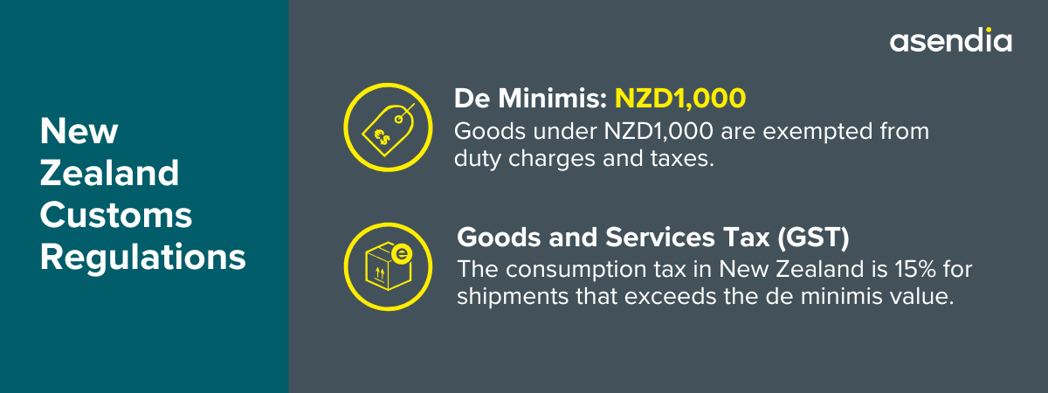Customs Regulations Overview in New Zealand

New Zealand’s de minimis value is NZD 1,000. This means if your shipment value is below the de minimis value, no duties and other fees will be collected; with an exception for alcohol and tobacco products which you will need to pay duty and taxes regardless of the value.
For more information on charges related to alcohol and tobacco products, please visit Allowances and Charges.
Before importing commercial goods into New Zealand, you need to submit an electronic import declaration. If your import goods value is over NZD1,000, you will also need to provide a client code, which you can obtain by completing a current NZCS Form 224. All goods imported into New Zealand need to be cleared by the New Zealand Customs Service (Customs) and the Ministry for Primary Industries (MPI).
Source: NZ Government Customs | TSW Fact Sheet
Required Customs Documents
1. Commercial Invoice
This is a must-have if you are shipping goods into New Zealand. Typically it will include the following information:
- Shipper and buyers’ full details (name, address, contact information, tax ID number)
- Shipment details (shipment ID, invoice number, PO number, export reasons)
- Description of goods including quantity
- Country of origin
- Cost of goods and any GST collected (indicate the currency)
Source: Zonos
2. Bill of Lading or Airway Bill
Depending on the mode of transport, you will need to either provide an airway bill for air and ground shipment, or a bill of lading for sea, train, and truck shipments.
3. Import Permit
Depending on the type of goods you are importing, sometimes you need to submit an import permit. For example, if you are importing goods such as medicine, vehicles, or machinery, you will need to obtain an import permit as these are considered prohibited and restricted goods.
4. Import Certificates
This is typically issued by the government authorities to ensure that the goods meet specific regulatory requirements and safety standards. Before you can import items such as food, animals, plants, and certain chemicals, you need to apply for this certificate beforehand.
5. Certificate of Origin
Used to certify the country in which a product was manufactured or produced. It typically includes details such as:
- Description of the goods
- Country of origin
- Exporter information
- Signature and stamp of the issuing authority



.png?width=979&height=295&name=NEW%20ZEALAND%20(2).png)
.jpg?width=2000&name=brooke-cagle-WHWYBmtn3_0-unsplash%20(1).jpg)
.jpg?width=2000&name=pexels-karolina-grabowska-5717947%20(1).jpg)
.jpg?width=2000&name=pexels-olly-787929%20(1).jpg)



.jpg?width=2000&height=897&name=Asendia_business_woman_AFB-large%20(2).jpg)



